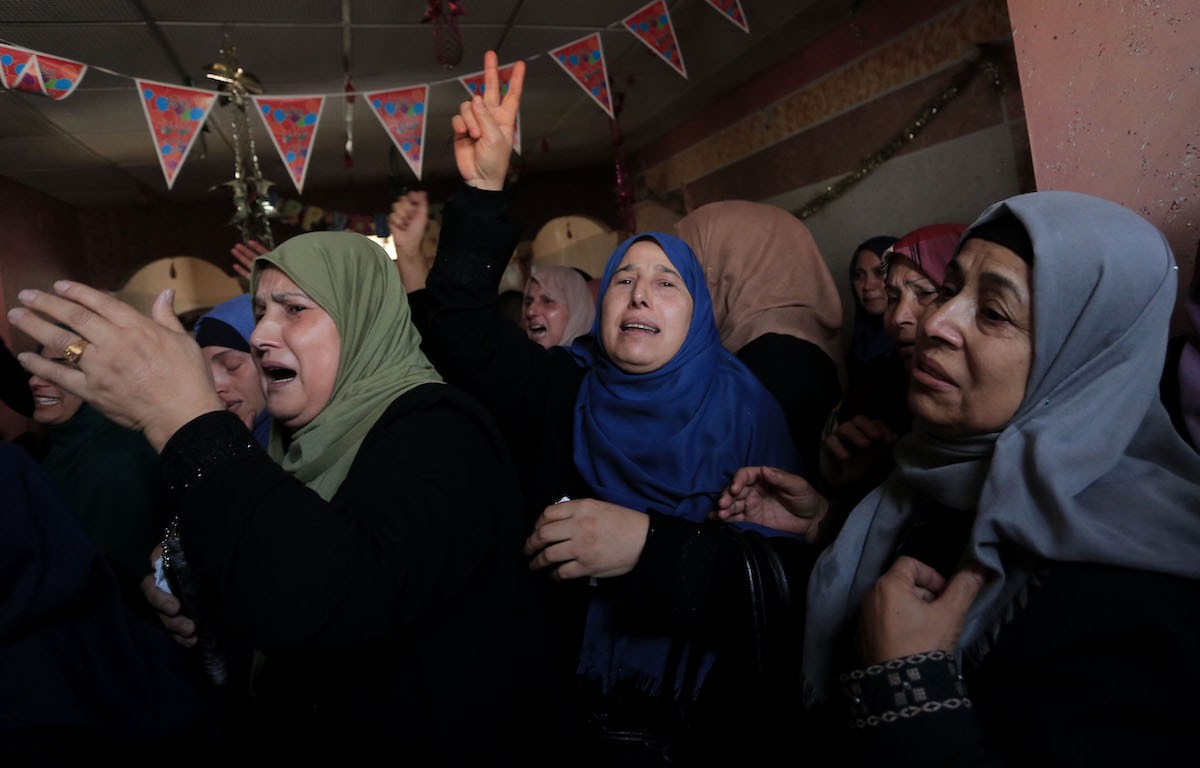Whilst 18 Israelis are treated for anxiety, 22 Palestinians are taken to the mortuary

The extrajudicial killing of Bahaa Abu Al-Ata of the Palestinian Islamic Jihad movement, the second largest faction in the Gaza Strip, has triggered a predictable spike in “conflict related incidents”. As always, it is the Palestinian civilian population residing in the much maligned Gaza Strip who are affected disproportionately.
On Wednesday morning, Israel’s supposedly “left wing” newspaper Haaretz reported that 18 Israeli civilians had been taken overnight to Ashkelon Hospital to be treated for “anxiety” following a spate of rocket fire emanating from Gaza. At the same time, a spokesperson for Gaza’s Health Ministry, Ashraf Al-Qudra, reported that the remains of 22 Palestinians were being transferred to the mortuary. A stark reminder, if ever one was needed, of the gross asymmetry of the “conflict” in Palestine/Israel.
For some, the “legitimacy” of Abu Al-Ata’s killing is a point of contention under international law. There is the usual binary rhetoric of “execution” versus “legitimate act of war” considered alongside debate over the appropriate designation of “combatant/non-combatant” status and the supposed protections therein. Regardless, and often set aside when debating the extrajudicial killing of “enemy (non)combatants”, it is worth remembering that Abu Al-Ata and his wife were killed in their bed in an Israeli rocket attack that destroyed his house in the Gaza City neighbourhood of Shuja’iyah, leaving his two children orphaned and undergoing emergency treatment at the local Al Shifa Hospital.
Similarly, there will be polarising views on the (il)legitimacy of the simultaneous attack on an Islamic Jihad political bureau member in Damascus, Akram Al-Ajouri, which resulted in the death of his son and a neighbour, and which also involved a flagrant breach of Syrian territorial sovereignty. Thus, what has been clear for some time, when it comes to the rules governing armed conflict and the application of principles of international law, it appears that “might is right” when Israel is involved.
Those with a strong commitment to realising the goals of a fair and, more importantly, a just resolution to the enduring conflict in Palestine/Israel will hardly be surprised by the bias and hypocrisy of Western politicians and the media taking to the airwaves to absolve Israel of any blame. Take, for example, the response of the spokesperson for EU Foreign Affairs and Security Policy, Maja Kocijančič, who tweeted in the aftermath of Abu Al-Ata’s killing that, “The firing of rockets on civilian populations is totally unacceptable and must immediately stop.” Or Joe Biden, in the running to be the next President of the United States, who tweeted, “It is intolerable that Israeli civilians live their lives under the constant fear of rocket attacks.” Not enough twitter characters, it seems, for either to make mention of the fact that it was the Israelis who kicked off this latest round of violence.

Smoke rises following an Israeli attack in Gaza city on 12 November 2019 [Ashraf Amra/Apaimages]
Arguably the greatest example of linguistic gymnastics is reserved for the headline writer in the Times of Israel, who led with, “Israel kills powerful Islamic Jihad commander”. Quite a stretch considering the modest arsenal at the disposal of Palestinian factions compared to a nuclear armed Middle East superpower with friends in high places. As leading Palestinian writer and activist Mariam Barghouti has noted, Palestinians, “aren’t leading a war. They have no official army, no official borders; they have no control over their resources and lands; and even their politicians are sometimes assassinated or incarcerated.”
The much-maligned Gaza Strip, considered to be unliveable by 2020 according to a UN report, continues to be the front line of resistance when it comes to Israel’s ongoing colonisation of Palestine. Weekly protests that call for an end to the illegal Israeli (and Egyptian) blockade imposed on the civilian population are often subject to extreme levels of Israeli violence, tantamount to “alleged war crimes” according to the UN and leading regional human rights organisations. Approximately 200 Palestinian civilians, including some 50 children, have been killed since the beginning of the protests in 2018, with many thousands left with life-changing injuries. Yet despite the tough talk from the UN Human Rights Council, when it comes to breaches of international law in Palestine, accountability and justice remain elusive.
It is hard to avoid the sense of déjà vu that surrounds this latest incident. As has been noted in other media outlets, the killing of Abu Al-Ata comes almost 7 years to the day that Israel assassinated Hamas leader Ahmed Jabari, the pretext to the 2012 ground invasion and eventual deadly military offensive against the Palestinians in Gaza. Back then, Israeli Prime Minister Benjamin Netanyahu was struggling to hold together his hotchpotch coalition government. In 2019, having gone through two General Election cycles this year without a clear winner, and with pressure mounting on political rivals to form a coalition, Israeli politics is in a similar state of flux. There is nothing better, apparently, than to carry out a choreographed, high profile assassination of a Palestinian to galvanise the nation.
With former Chief of Staff Benny Gantz — chief architect of Israel’s 2014 destruction of Gaza — waiting in the wings, the prospect of an Israeli coalition government comprising Netanyahu, Gantz and Israeli hawk Naftali Bennett as “Defence” Minister seems more likely than ever. It remains to be seen how the latest, cyclical round of violence will evolve, but no amount of false equivalency can mask the fact that this is a dangerously one-sided affair centred on Israeli political posturing.
Source: Middle East Monitor

WRITE YOUR COMMENT